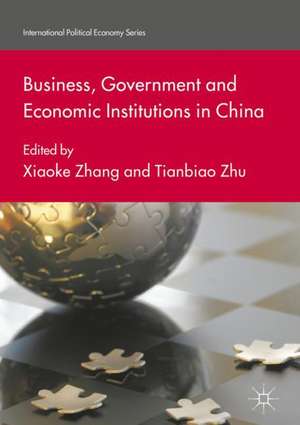Business, Government and Economic Institutions in China: International Political Economy Series
Editat de Xiaoke Zhang, Tianbiao Zhuen Limba Engleză Hardback – 2 feb 2018
| Toate formatele și edițiile | Preț | Express |
|---|---|---|
| Paperback (1) | 641.53 lei 6-8 săpt. | |
| Springer International Publishing – 7 iun 2019 | 641.53 lei 6-8 săpt. | |
| Hardback (1) | 901.88 lei 6-8 săpt. | |
| Springer International Publishing – 2 feb 2018 | 901.88 lei 6-8 săpt. |
Din seria International Political Economy Series
- 20%
 Preț: 751.82 lei
Preț: 751.82 lei -
 Preț: 430.59 lei
Preț: 430.59 lei -
 Preț: 147.23 lei
Preț: 147.23 lei - 17%
 Preț: 363.47 lei
Preț: 363.47 lei - 17%
 Preț: 490.23 lei
Preț: 490.23 lei -
 Preț: 428.68 lei
Preț: 428.68 lei - 9%
 Preț: 762.79 lei
Preț: 762.79 lei - 20%
 Preț: 690.96 lei
Preț: 690.96 lei - 20%
 Preț: 627.54 lei
Preț: 627.54 lei - 20%
 Preț: 566.63 lei
Preț: 566.63 lei - 15%
 Preț: 644.30 lei
Preț: 644.30 lei -
 Preț: 389.11 lei
Preț: 389.11 lei -
 Preț: 385.08 lei
Preț: 385.08 lei - 15%
 Preț: 644.30 lei
Preț: 644.30 lei -
 Preț: 389.31 lei
Preț: 389.31 lei -
 Preț: 413.84 lei
Preț: 413.84 lei -
 Preț: 387.38 lei
Preț: 387.38 lei - 15%
 Preț: 638.89 lei
Preț: 638.89 lei - 15%
 Preț: 644.63 lei
Preț: 644.63 lei - 18%
 Preț: 893.71 lei
Preț: 893.71 lei -
 Preț: 412.47 lei
Preț: 412.47 lei -
 Preț: 325.08 lei
Preț: 325.08 lei -
 Preț: 395.47 lei
Preț: 395.47 lei - 15%
 Preț: 641.85 lei
Preț: 641.85 lei -
 Preț: 391.40 lei
Preț: 391.40 lei -
 Preț: 392.60 lei
Preț: 392.60 lei -
 Preț: 388.34 lei
Preț: 388.34 lei - 15%
 Preț: 640.55 lei
Preț: 640.55 lei -
 Preț: 389.70 lei
Preț: 389.70 lei - 15%
 Preț: 646.30 lei
Preț: 646.30 lei - 15%
 Preț: 637.78 lei
Preț: 637.78 lei - 15%
 Preț: 643.84 lei
Preț: 643.84 lei -
 Preț: 386.99 lei
Preț: 386.99 lei - 15%
 Preț: 641.53 lei
Preț: 641.53 lei -
 Preț: 386.81 lei
Preț: 386.81 lei - 15%
 Preț: 639.73 lei
Preț: 639.73 lei - 18%
 Preț: 944.19 lei
Preț: 944.19 lei -
 Preț: 391.40 lei
Preț: 391.40 lei -
 Preț: 330.65 lei
Preț: 330.65 lei -
 Preț: 394.12 lei
Preț: 394.12 lei -
 Preț: 386.99 lei
Preț: 386.99 lei -
 Preț: 386.81 lei
Preț: 386.81 lei - 15%
 Preț: 634.68 lei
Preț: 634.68 lei -
 Preț: 387.75 lei
Preț: 387.75 lei - 15%
 Preț: 641.53 lei
Preț: 641.53 lei - 15%
 Preț: 640.06 lei
Preț: 640.06 lei - 15%
 Preț: 643.16 lei
Preț: 643.16 lei - 15%
 Preț: 642.68 lei
Preț: 642.68 lei - 15%
 Preț: 641.85 lei
Preț: 641.85 lei - 15%
 Preț: 637.13 lei
Preț: 637.13 lei
Preț: 901.88 lei
Preț vechi: 1099.85 lei
-18% Nou
Puncte Express: 1353
Preț estimativ în valută:
172.59€ • 179.17$ • 143.92£
172.59€ • 179.17$ • 143.92£
Carte tipărită la comandă
Livrare economică 22 martie-05 aprilie
Preluare comenzi: 021 569.72.76
Specificații
ISBN-13: 9783319644851
ISBN-10: 3319644858
Pagini: 344
Ilustrații: XIV, 359 p. 7 illus., 5 illus. in color.
Dimensiuni: 148 x 210 mm
Greutate: 0.76 kg
Ediția:1st ed. 2018
Editura: Springer International Publishing
Colecția Palgrave Macmillan
Seria International Political Economy Series
Locul publicării:Cham, Switzerland
ISBN-10: 3319644858
Pagini: 344
Ilustrații: XIV, 359 p. 7 illus., 5 illus. in color.
Dimensiuni: 148 x 210 mm
Greutate: 0.76 kg
Ediția:1st ed. 2018
Editura: Springer International Publishing
Colecția Palgrave Macmillan
Seria International Political Economy Series
Locul publicării:Cham, Switzerland
Cuprins
Chapter 1. Understanding Business–Government Relations in China: Changes, Causes and Consequences.- Chapter 2. Business–State Relations in China’s Changing Economic Order.- Chapter 3. The Evolution of Government–MNC Relations in China: The Case of the Automotive Sector.- Chapter 4. Regional Business Associations in China: Changes and Continuities .- Chapter 5. Trapped into Collusion: The Under-Institutionalized Taxation System and Local Business–State Relations in China.- Chapter 6. Chinese Private Entrepreneurs’ Formal Political Connections: Industrial and Geographical Distribution.- Chapter 7. International Context and China’s Business–Government Relations.- Chapter 8. Business–Government Relations and Corporate Governance Reforms.- Chapter 9. The Changing Business–State Relations in China: The View from Socialist Corporatism.- Chapter 10. State Structures, Business–State Relations and Multinational Corporate Behaviours: A Case Study of Chinese Multinational Oil Companies.- Chapter 11. Business–State Interactions and Technology Development Regimes: A Comparative Analysis of Two Metropolises.- Chapter 12. Conclusions and Reflections.
Notă biografică
Xiaoke Zhang is Professor at Alliance Manchester Business School, University of Manchester, UK. His major research interests are in political economy and comparative management, with a regional focus on East Asia.
Tianbiao Zhu is Professor and Executive Dean at the Institute for Advanced Study in Humanities and Social Sciences at Zhejiang University, China. His research centers around the disciplines of International and Comparative Politics, International and Comparative Political Economy, and the Political Economy of Development.
Textul de pe ultima copertă
This book brings together conceptual and empirical analyses of the causes and consequences of changing business–government relations in China since the 1990s, against the backdrop of the country’s increased integration with the global political economy. More specifically, it provides an interdisciplinary account of how the dominant patterns of interactions between state actors, firms and business organizations have changed across regions and industries, and how the changing varieties of these patterns have interacted with the evolution of key market institutions in China. The contributors to this edited volume posit that business–government relations comprise a key linchpin that defines the Chinese political economy and calibrates the character of its constitutive institutional arrangements.
Caracteristici
Uses a typological framework that focuses on how authoritative governance and market coordination interact to generate different forms and patterns of state–business relations One of a limited number of empirical studies on the impact of changing interactions between state and business actors on the emergence of new market institutions Brings together world experts in the fields of Asian business and government in one edited collection
